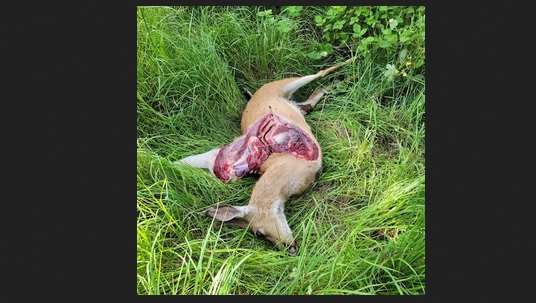Rewards doubled for information leading to the individuals(s) using pellet guns to harass and kill deer in Roseburg this summer following multiple calls to report carcasses to the Turn In Poachers (TIP) line.
The Oregon Hunters Association (OHA) is offering $2,000 cash, or four ODFW hunter preference points for information that leads to an arrest or citation in any of the incidents.
Residents reported multiple black tailed deer carcasses in July, in the Meadows neighborhood, where deer are known to roam. OSP Fish and Wildlife Troopers discovered five deer carcasses, including at least one that died from a pellet lodged in its lung.
“It was a nice, forked horn buck that ended up dying next to a resident’s barn,” said OSP F&W Senior Trooper Jason Stone, “The pellet broke a rib and clipped it’s lung, which caused it to hemorrhage. Both lungs then filled with blood.”
Troopers canvasing the area learned that some residents use pellet guns to haze deer away from gardens and landscaping. This concerns people like Kelly Forney, who is both a State Director and board member for the Umpqua chapter of OHA.
“The wanton shooting of deer in this busy neighborhood is a serious offense that should be punished,” Forney said, “A significant TIP reward will encourage those that know about this crime to come forward.
Senior Trooper Stone agrees.
“People think that pellet guns won’t hurt deer, but if the pellet lodges in the right place, it can be lethal,” Stone said, “Regardless of if they intend to harass or haze animals, if they kill the animal, it is still an unlawful take and we don’t want to see that continue.”
Hot weather conditions caused several of the carcasses to decompose, making it impossible to determine cause of death. The area is also known to have Epizootic Hemorrhagic Disease (EHD), which is a viral infection. Deer with EHD become lethargic and lose their appetite, become weak, have bloody diarrhea, and show excessive salivation. They develop a rapid pulse and respiration rate along with fever.
The fevered deer seek out water to cool down. Water also harbors mosquitos and gnats, which spread the disease. All five carcasses were located within 200 yards of stagnant ponds, according to Troopers.
State veterinarians first confirmed the presence of EHD in the Roseburg area in 2014, and it has persisted. Humans and pets are not susceptible to EHD, according to wildlife officials, but it raises the importance of reporting any deer carcasses to the TIP Line to be investigated.
If you know of or suspect other crimes against fish wildlife or habitat, please report to the Turn In Poachers (TIP) Line. 1-800-452-7888 or *OSP (*677) from a mobile phone. Or email: [email protected].
For additional information on EHD, visit: https://www.dfw.state.or.us/wildlife/health_program/andevirus/index.asp
The Protect Oregon’s Wildlife- Turn In Poachers campaign educates the public on how to recognize and report poaching. This campaign is a collaboration among state agencies, sportsmen and other conservationists, landowners, and recreationists to engage the public in combatting Oregon’s poaching problem. Our goal is to: Incentivize reporting on wildlife crimes through the TIP Line; Strengthen enforcement by increasing the number of OSP Fish and Wildlife Troopers; and Support prosecution in becoming an effective deterrent. The campaign helps to protect and enhance Oregon’s fish and wildlife and their habitat for the enjoyment of present and future generations. Contact campaign coordinator Yvonne Shaw for more information. [email protected].
Disclaimer: Articles featured on Oregon Report are the creation, responsibility and opinion of the authoring individual or organization which is featured at the top of every article.


